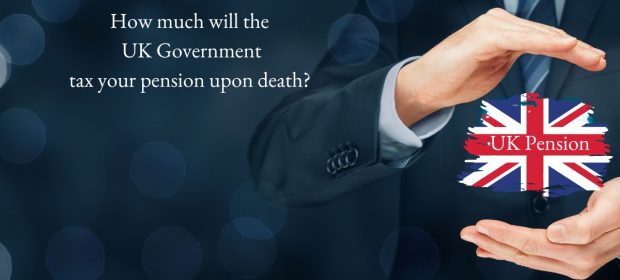One of the most confusing aspects for expats is establishing where they should be paying tax after they have left the UK. Many just assume that there is no UK liability after they have left.
I’ve left the UK – why am I still paying tax there?
By Portugal team
This article is published on: 17th March 2023

UK property
Tax on income and gains from UK property is always taxed in the UK, even if you live in Portugal with or without NHR status. You do still have your UK annual personal allowance and capital gains tax allowance to offset against any taxable income or gains as a non-UK resident.
You must also declare this in Portugal and will receive a tax credit for the tax paid in the UK to offset any Portuguese tax liability.
UK government pension income
The taxing right remains with the UK in respect of former government service pension income, and you have your UK personal allowance to offset against this.
Government service pension schemes are not the same as the UK State Pension. The State Pension is not taxable in the UK, can be paid out to you gross and is taxable in Portugal.
UK private pension schemes
Private pension schemes are taxable in Portugal. Again, the income can be paid out to you gross by your pension provider. However, in practice, some people still find themselves having tax deducted at source on UK pension income and must reclaim it. If you complete a DT/individual form, available from HMRC’s website, and follow the submission process you will be able to receive your pension free from UK tax at source.
UK dividend & interest trap!
The UK has the right to tax UK-sourced dividends and interest under the treaty rules between the UK and Portugal but an interesting quirk of the rules is that when you submit your UK tax return HMRC will automatically calculate the best outcome for you; either to not tax your UK dividends and interest and in turn, you lose your UK personal allowance (this is called disregarded income treatment) or to tax them and preserve your personal allowance to offset against other income e.g. rental.
Special care must be taken if claiming split-year treatment – this is when you leave the UK partway through the tax year and you are only taxed in the UK from 6th April to the date you leave. A real-life example: an individual who left the UK in July subsequently took a large dividend in the same UK tax year. As a result, the dividend was taxed in the UK (even though they were no longer UK resident) and this resulted in a hefty tax bill. Had they waited until after the following 6th April, HMRC would not have taxed this.
Exceeding your UK day count
Another scenario where you could find yourself a UK tax resident, even though you have moved abroad, is when the relevant day count allowance is exceeded. The UK Statutory Residence test clearly sets out the rules and the allowable number of days to avoid getting yourself into this grey area. The day count can be as little as 16 days and as much as 182 days depending on the number of ties and connections you have.
UK Inheritance Tax
Another context when you can still have a UK liability is in respect of succession and inheritance tax. This is a complicated area, and we will dedicate next week’s article to exploring this topic.
Can you sell your UK business and pay 0% tax?
By Portugal team
This article is published on: 14th March 2023

Many British business owners may not have considered selling their UK business as a Portuguese tax resident, and whilst the UK rules for selling business are generous, we have seen several business owners enjoy better outcomes here in Portugal.
Opportunity
Non-Habitual Residence (NHR) status allows those in receipt of foreign-sourced dividends to receive them free of tax. This has proven to be a great opportunity for UK business owners who can enjoy the luxury of running their businesses at arm’s length.
But most owners do not want to run their businesses forever, and what many may not have realised is that selling their business whilst Portuguese tax resident could be highly tax efficient and, in some cases, provide a better result than the UK.
Real-life example
We recently worked with a business owner who had agreed to sell their UK-based business, but the sale would take some time to complete.
They knew what their tax liability on the sale would be in the UK but were keen to move to Portugal quickly, rather than wait for the sale to complete whilst they were resident in the UK. They were understandably disappointed to learn that the potential tax liability in Portugal would be markedly higher, at 28%.
However, on reviewing the structure of the business and how the sale was arranged, we were able to advise on a position where the couple could move to Portugal immediately with a resulting zero tax liability. Additionally, working with a local accountant, it was possible to create an accounting loss for them to use against future gains in Portugal.
In addition, we presented a highly diversified and managed risk solution to preserve and grow their wealth, whilst also future-proofing them for the end of their NHR status and a possible return to the UK.
The position turned out to be better for them selling as Portuguese tax residents, rather than UK tax residents, and they got to get on with their new life in the sun sooner than originally planned.

Replacing business income
The most important step following a sale or after drawing large dividends is finding an appropriate new home for the cash – you do not want it sitting in the bank being eroded by inflation, invested in inappropriate structures, or held tax-inefficiently going forward.
Whether you want to replace the income you once enjoyed, or preserve wealth for future generations, the key is structuring correctly for your goals. This must take into account several factors, such as where you and your ultimate beneficiaries are resident and the associated tax implications, flexibility in access and appropriate investment strategies, to name just a few.
Explore your options
We regularly work with business owners’ UK accountants, tax advisers and other trusted parties to explore restructuring and selling options. We are also on hand for clients to ensure that the advice is coherent, viable and implemented correctly from a cross-border perspective.
We also work with clients to put longer-term plans in place to ensure ongoing tax efficiency, compliance, and wealth preservation here in Portugal. If you would like to explore your options, please contact us for an initial discussion.
End of the Golden Visa in Portugal
By Portugal team
This article is published on: 3rd March 2023

The Golden Visa scheme (est. 2011) was a residency-by-investment scheme, and whilst very attractive to individuals, has always been considered controversial by some Portuguese politicians as well as various EU governmental authorities.
It allowed non-EU nationals to obtain residency rights in Portugal (and therefore access to the Schengen area) by making relatively low capital investments into real estate or Portuguese-based investments. It also had very loose minimum stay requirements of only seven days per year.
What happened?
As a result of the influx of foreign investment, mainly into the housing market, Portugal’s real estate sector exploded.
The increased demand for property has not only driven up property prices but also affected the rental market. Many of these properties have been made available for short-term lets e.g. AirBnB, because of the lucrative returns in comparison to long-term lets. In one of the poorest countries in Europe, where the minimum wage is just €760 per month (2023), it has led to a housing market crisis, pricing out many Portuguese nationals.
There have been efforts over the years to try and reduce the negative effect on the real estate market by restricting the qualifying investment locations, excluding the more popular coastal and city areas. But under increasing pressure, the Golden Visa scheme was terminated with immediate effect in February 2023. Premier Costa stated that it was, “no longer justified” and that it has served its purpose to inject much-needed investment into Portugal over the last decade.

What about those with the Golden Visa?
The Golden Visa is valid for five years. Those already in the scheme will only be able to renew their visa if they use the property as their own home or if they make it available for long-term lets.
No new Golden Visa applications will be accepted.
Other visa options
Despite the end of the Golden Visa scheme, many other options are available to prospective ex-pats. The most appropriate one for you will depend on your circumstances and intentions.
For example, a D7 visa requires applicants to have a minimum level of passive income and does not allow the individual to work in Portugal. The D2 visa is aimed at attracting entrepreneurs who wish to establish an economic activity in Portugal and will allow the individual to work. There are also visas aimed at digital nomads.
Are the stars aligning for investors?
By Portugal team
This article is published on: 27th February 2023

It’s been a rough time recently for financial markets with many falling in 2022.
We’ve experienced a once in a hundred-year combination of events, with the global pandemic, recession fears, rising inflation and interest rates, the war in Ukraine and the farcical situation of five changes of British Prime Minister in just six years!
With that backdrop, it is no wonder markets have struggled, but there are several interesting statistics to show that now may in fact be a good time to invest if you are holding excess cash.
1. Falling markets mean the growth outlook has improved
The first point is counterintuitive, but the 2022 market declines have actually improved growth expectations.
For example, Vanguard, the second largest fund manager in the world, has recently revised its growth forecasts upwards and believes that investors will now be better off over the next decade than if 2022 had not occurred.
Vanguard’s growth forecasts for global equities are now 7.4%-9.4% over the longer term.
The fall in bond prices in 2022 has similarly resulted in better growth expectations, as lower prices mean new investors are now enjoying higher levels of income yield.
2. 2022 was very rare in investment terms
Bonds and shares/equities tend to move in different cycles i.e. if shares are falling in value, investors seek the relative safety and income of bond investments and this causes bond prices to increase in value.
However, this relationship broke down in 2022, being one of only three years in the last 45 where shares and bonds were down at the same time – the chance of this happening going forward is low.
3. Two consecutive years of stock market falls is rare
Data from NYU shows that the chance of having two consecutive years of stock market declines (as measured by the US S&P 500 index) is low. The chance of 2023 being negative is just 9% based on this data.
4. Short periods to recover losses
Figures from Gugenheim have examined previous market falls of between 20 and 40% and found that the average time to recover the losses is just 14 months.
With global markets starting their declines in late 2021, based on this statistic we would be nearing the end of the downturn in markets.

5. Equities outperform cash over different time periods
Some investors perceive cash as more secure than shares. However, data from Blackrock shows that shares (S&P 500) outperform cash (Treasury bills) over many different time periods, even short time horizons.
The statistics I found particularly interesting are that, even on a short-term basis, shares would outperform cash holdings, for example 64% of the time over one month and 81% over one year.
6. Time is on your side
Data from Macrobond covering the 1971 to 2022 period shows that time is on your side with investments.
Over any one-year period, the chance of generating a positive return is 72.8%, but if you extend the period to 10 years the chance of a positive return increases to 94.2%.
These statistics of course are not a guarantee that markets will recover in 2023, but the convergence of all these factors is, for some investors, a positive indicator for the direction of equity returns for the year or two ahead.
More important though is that short-term market events should not be a distraction when implementing a long-term investment strategy.
We can guide you on how and where to structure your investments efficiently as a Portuguese tax resident, whether or not you are a Non-Habitual Resident, and how to futureproof these investments from changes in your personal circumstances.
Looking towards the end of Non-Habitual Residence in Portugal
By Portugal team
This article is published on: 22nd February 2023

The Non-Habitual Residence (NHR) tax scheme has attracted many new residents to Portugal and has been a bonus for those relocating here for lifestyle reasons.
Whilst the scheme offers a 10-year ‘window’ of tax-reduced or even tax-free living, the position following the 10-year point can bring a substantial increase in tax exposure. However, with careful planning, it is possible to put yourself in a similar or even better position post-expiry of your NHR status.
Your position post NHR
After the NHR term, you are simply treated as a standard Portuguese taxpayer, and we can look at the contrast between pre and post-NHR treatment through the examples of UK property, pensions and dividends.
UK property
During NHR, any rental income from UK property is tax-free in Portugal, however post-NHR it becomes taxable at 28%.
In addition, during NHR you can sell UK property free of Portuguese capital gains tax but post NHR, you will face scale rates of tax on 50% of the gain. This difference can be particularly stark when considering the sale of a former UK main residence, as the following case of a lady we helped shows.
She purchased her UK home for £725k and the current value was £1.5m. She was unsure whether to sell her UK property shortly after moving to Portugal or to wait. Because of the timing of the sale, selling shortly after her arrival in Portugal would result in no tax in the UK and no tax in Portugal.
If she waited until after the NHR period, UK capital gains tax would be due on the gain made from April 2015 to the date of sale at 18%/28%, and additionally, tax would be due in Portugal on 50% of the gain at scale rates (up to 48% plus solidarity tax 2%/5%). Note, credit is given in Portugal for tax paid in the UK.
Pensions
During NHR, pension income is taxed at 0% (for pre–April 2020 NHRs) or 10% (for post-April 2020 NHRs).
However, after NHR, this will jump to at least 28%, and possibly up to 48% depending on the type of pension and how it is reported by your accountant.
If you have the 0% pension tax rate, it is important to not deplete your pension too quickly, as taking large lump sum payments can risk an unexpected tax charge. The tax office may deem the income to be long-term savings income rather than pension. If you are in this position and wish to deplete your pension during NHR you should take advice if you have not done so already.
UK dividends
UK dividends enjoy a 0% tax rate under NHR but post NHR this increases to 28%.

There are solutions
The key is planning early so, whether you are nearing the end of your NHR period or just starting, you should seek guidance as early as possible.
As an example, to avoid the increase in tax on pension income, it is possible to deplete your pension scheme completely during the NHR period and reinvest in a more tax-efficient structure that will continue to provide income post-NHR but be much more tax-efficient (single-digit or at least very low relative tax rates).
For those drawing dividends from UK companies, some may be considering an exit from their business and the end of NHR can be a catalyst for reviewing options for a business sale (0% tax on the sale is achievable in certain situations).
Returning to the UK?
Some clients will have a 10-year plan to remain in Portugal whilst they have NHR status, and then relocate back to the UK when their NHR expires. For these clients, there are planning opportunities to re-enter the UK system very tax efficiently but advice must be sought on an individual basis.
10 common financial planning mistakes expats make
By Portugal team
This article is published on: 13th February 2023

Whether you are living in Portugal or thinking about a move, you will have heard lots of tips and tricks from friends and done your fair share of Googling. Here we list some of the most common planning mistakes so you can avoid them.
1. Planning too late
Most people tend to be reactive rather than proactive when it comes to sorting out their finances. Planning ahead of your move will allow you to take full advantage of all the windows of opportunity and the tax savings Portugal has offer. But if you have already moved and have not made plans yet, it is not too late to improve your long-term position. Don’t put it off.
2. Syncing for a different system
Some people do not review their assets and are of the view that their planning has worked just fine up to now. But Portugal’s system is markedly different from the UK and you could unknowingly be doing yourself out of benefits and tax breaks, or even worse, creating further (unnecessary) tax liabilities.
3. Not applying for Non-Habitual Residency (NHR)
Applying for NHR is generally a financial “no-brainer”. Just because you think you don’t need it now, does not mean it may come in handy in the future. You only have a small window of opportunity to apply for NHR once you become a resident of Portugal, so do not miss out. It could save you thousands in taxes in the long run.
4. Withdrawal strategies
Taking money from the wrong place, at the wrong time or at an inopportune time can be expensive and create tax liabilities that could otherwise be avoided. If possible, you should plan at least 12 months in advance and take advice if you are not sure of the best way forward.
5. Not paying attention to fees and charges
Charges can profoundly affect returns but can be disguised by good market performance and/or ‘clever’ advisers. Read the small print, ask questions and shop around to find out if you are really getting a good deal.

6. Focusing on return and not risk
Many investors focus solely on headline performance and do not consider investment returns in the context of risk. This is important, particularly if you are a balanced or cautious investor. If two portfolios generate an average of 5% a year but one is very high risk and the other is very low risk, clearly one portfolio is better than the other.
7. Not knowing your ‘number’
Do some cash flow planning. Many are unaware of how much they can safely spend based on their current wealth, pension provision and the need to plan for unforeseen expenses. They either spend too much and jeopardise their future lifestyle or worry unnecessarily and underspend, possibly missing out on a lot of fun!
8. Not reviewing enough or reviewing too much
We suggest you review your finances at least every 12 months. Times change and as new solutions become available, costs usually go down. But equally micro-managing and frequent changes are also counterproductive as it usually involves cost and stress. Get the right balance.
9. Not shopping around
If you meet a professional you like, that is great. However, shop around. Meet others and stress test the advice and proposition. Just because someone seems nice, does not mean they are the best person for the job.
10. Not planning for UK Inheritance Tax
Many believe that once they are out of the UK inheritance tax will not apply. This is wrong as it will always apply if you are UK domiciled. Moreover, you could also have a Portuguese tax liability meaning there could be double taxation. Ensure that you address estate planning as early as possible.
How much could the UK tax my pension?
By Portugal team
This article is published on: 6th February 2023

Could the UK government take up to 60% of your pension?
The Institute for Fiscal Studies (IFS) published a paper on 15th December 2022 recommending that the UK government introduce a basic rate (20%) income tax charge and Inheritance Tax (IHT) at 40% on monies left in UK pensions on death, regardless of age.
Generosity of current rules
Under current rules, your pension can pass to your beneficiaries free of UK Inheritance Tax (IHT), rather than being subject to the standard 40% rate. Additionally, if you die before age 75, your beneficiaries do not need to pay any tax on drawdown/lump sums. If you die after 75, and your beneficiaries are UK tax resident, they are subject to income tax at their marginal rate.
This is what makes pensions so valuable for tax planning and advisers will usually recommend that they are maximised and preserved, and that other assets subject to IHT are used to fund spending first, to reduce the value of your estate.
What could change?
The IFS pointed out that the current tax rules on UK pensions are very generous and pensions have become a succession planning tool rather than one for retirement provision.
Experts are musing that the UK government could change these generous IHT rules; many say this is overdue. More worryingly, they are anticipating a potential change in 2023.
The IFS recommended that a basic 20% rate is applied to any pension savings left on death, irrespective of age. Also, the pension should form part of the deceased’s estate for IHT, incurring a further 40% tax.
Why the change?
Simply put, changing the pension IHT rules would fill a big hole in the Exchequer’s coffers by bringing millions of pensions into the IHT net. It would also persuade many people to start spending their pension pots and in turn, pay income tax on the drawdown during their lifetimes.
The report explained how the generous UK pension rules specifically in relation to IHT have caused a “bizarre situation” where instead of pensions primarily being an attractive structure for old-age-planning, they have become a lucrative IHT loophole. The IFS also pointed out, “if we are to have an inheritance tax at all, it should apply evenly across all forms of wealth.”
We have also seen pensions being periodically targeted over the past decades, with taxation and limits applied in the form of Annual Allowance, Money Purchase Annual Allowance and the continuing reduction of the Lifetime Allowance, from £1.8.m in 2011/2012 to £1,073,100 in the tax year 2022/2023 – all with the aim of curbing the tax benefits. There are even serious talks of bringing the increase in the UK State Pension age forward from 2046 to 2035.

Will this affect you?
Those with estates valued in excess of £325,000 (if single) or £650,000 (jointly), including pension values, would be affected by any potential change.
It is unclear how any potential change would be introduced, although the IFS has suggested phasing in changes. It is also unclear if existing benefits would be sheltered from the change or if the rules would be retrospective, thus catching all pension savers. Although, the IFS did say that even with phasing, there would be some retrospective taxation effect.
What should you do?
Of course, there is no guarantee this will happen, but if changes are imposed there may be little or no opportunity to restructure your pensions. As a non-UK resident, you can take action now and review your finances to ensure you are protected.
The financial implications of your SEF appointment
By Portugal team
This article is published on: 31st January 2023

Brexit pushed many British expatriates to apply for residency – Immigration and Borders Service’s desk / Serviço de Estrangeiros e Fronteiras (SEF) to be able to stay more than 90 days in every 180 within the Schengen area, but what some may not fully understand are the implications.
Triggering tax residency
When applying for residency in Portugal you are effectively declaring your intention to stay in Portugal for more than six months. Staying in Portugal for more than 183 days a year will trigger tax residency and financial reporting obligations; you cannot simply continue paying taxes in the UK.
Brits must also be mindful of the UK statutory residence test because this could inadvertently entangle you in the UK tax net if too much time is spent back in the UK, even if you are declaring yourself as a Portuguese tax resident and spending more than 183 days in Portugal. This is not something you want to be caught up in, especially if you intend to take advantage of Portugal’s Non-Habitual Residency (NHR) scheme. You want your tax residency status to be clearly in Portugal.
Tax liabilities in Portugal
Tax residents of Portugal must declare their worldwide income and gains in Portugal.
For those with assets in several countries, you might also have tax and reporting obligations in the jurisdictions where you hold your assets. For example, UK rental income always remains taxable in the UK and is also reportable and taxable in Portugal. Conversely, UK tax is not due on UK pension income (unless it is a government scheme), but it is fully reportable and taxable in Portugal.
Whether you will pay tax twice depends on the Double Taxation Treaty between the two countries, but there are usually rules in place to avoid this happening.

Make the most of it
New residents of Portugal can apply for NHR which gives generous tax breaks on foreign-sourced income and in some cases, Portuguese arising employment income, for a period of 10 years. However, the right planning and preparation is needed, and you may need to restructure your affairs to take full advantage of the scheme. Once the NHR period ends, normal Portuguese tax rates apply.
NHR certainly provides generous tax breaks but what many do not realise is that it is also a ‘window of opportunity’ where you can plan for a tax-efficient future after NHR. For example, it is much more tax advantageous to dispose of overseas property during the NHR period when gains are exempt in Portugal, rather than post-NHR when 50% of the gain is subject to scale rates of tax.
Even for those without NHR, there are compliant structures that can reduce or eliminate income and gains tax for significant long-term tax savings. Ideally, such structures are funded during the NHR phase, so it is never too early to start planning.
Expatriates have complicated affairs: tying up loose ends in their home country, navigating the legalities and processes in Portugal, keeping track of what taxes are due where, and ongoing compliance with changing tax rules in various jurisdictions. With so many moving parts it is important that planning is not done in isolation, it is reviewed regularly and undertaken with experienced and qualified advisers.
Debrah Broadfield and Mark Quinn are Chartered Financial Planners (level 6 CII) and Tax Advisers (ATT) with nearly 20 years of combined experience advising expatriates in Portugal on cross-border tax and financial issues. Find out more at spectrum-ifa.com or contact us at +351 289 355 316 or mark.quinn@spectrum-ifa.com.
Protecting your wealth
By Portugal team
This article is published on: 20th January 2023

What can you do in turbulent times?
With rising inflation, war, political instability and the energy crisis, 2022 thus far has been a perfect storm and markets have responded. What action do you need to take to protect your wealth?
Review your position
The single most important thing you must do is act and not bury your head in the sand. Whether you have recently made changes or have never taken any action, you should be taking a look at:
- Structures: Are they correct for you in Portugal or are you still holding on to investments you made whilst resident elsewhere? Are you taking advantage of all the tax reliefs? Unnecessary taxation is extremely damaging to family wealth
- Cost: Check what you are paying as this is an eroder of wealth; especially when markets take a downturn. Are they convoluted and hidden in lots of paperwork? Are they competitive? Are you receiving a competent level of service for the fees you pay?
- Risk: Do you know how much you are taking? Are you being compensated for it or can you achieve the same return elsewhere without taking as much risk? A robust investment portfolio is a diversified one that is risk rated to your appetite for risk and capacity for loss
- Holdings: Are they suitable for you and your goals? Are they liquid or are they at risk of being suspended? You do not want to need money only to find you are ‘locked in’, have penalties or your investment has been frozen
- Performance: Are your investments performing well in comparison to the market? Poor performance can be a result of many factors, such as relying on past performance, excessive charges, manager performance, inaction, market movements or taxation, to name a few

Work with experts
Taking sound advice comes with a cost but could save you a lot of money in the long run. Whether that be in income, capital gains or inheritance tax, improved investment returns or preservation in the downturns. It will also provide you and your family peace of mind.
How do you take advice safely?
- History of the business: How long have they been established and what is their ethos? Where are they regulated? Are they part of a larger company but with a different name? Dig deeper, look for reviews and check your individual adviser’s history
- Impartiality: Are they impartial or do they only work exclusively with certain providers and fund managers? A variant of this is they have their own branded funds/investments that they are incentivised to put you into to get more commission
- Qualified: Does your adviser have the expertise to guide you on the complexity of cross-border pensions and investments? Do they understand the implications of selling a product to you in Portugal and your originating country? Check what qualifications they have and whether are they relevant
- Charging terms: Ask for an explicit breakdown of costs, including retrocession fees/commissions. Is your adviser willing to give you this in writing in a simple-to-understand format? Are the fees competitive?
- Service: Will you have an ongoing relationship with your adviser or will you be passed to someone else once a sale has been made? Will they provide a quality service for the ongoing fees you will be paying?
With over 30 years of combined experience in the industry and over 15 in Portugal, we are best placed to provide expert, impartial and personalised advice to expatriates. Please contact us if you wish to discuss your position.
Debrah Broadfield and Mark Quinn are Chartered Financial Planners (level 6) and Tax Advisers specialising in cross-border advice for expatriates. Contact us at: +351 289 355 316 or mark.quinn@spectrum-ifa.com/debrah.broadfield@spectrum-ifa.com
Can I keep my UK bank account and ISA?
By Spectrum IFA
This article is published on: 17th January 2023

Each person should seek individual advice when it comes to financial planning but here, we touch on some commonly held UK assets and the main points that you should be aware of.
Bank accounts
Post-Brexit many UK banks have ceased services to non-UK residents forcing clients to seek out Sterling-based accounts elsewhere. The Channel Islands and Isle of Man are popular alternatives to the UK when it comes to banking, but these are considered ‘blacklisted jurisdictions’ by Portugal and interest is punitively taxed at 35%, rather than the usual 28% or 0% under NHR (Non-Habitual Residence).
ISAs
ISAs do not retain the same tax exemptions when held by Portuguese residents and are treated in the same manner as standard investment portfolios. For NHRs, generally, interest and dividends are tax-exempt and realised gains are taxed at 28%, but if your ISA holds funds, based on the strict reading of the tax law, returns are classed as ‘other income’ and taxed at 28%. For non-NHRs, interest, dividends and gains are taxed at 28%.
Whether you retain or restructure your UK ISA will depend on your longer-term plans.
If your move to Portugal is short-term, or if you are not certain that it will be your long-term home, then there is a case for retaining your ISAs. Although you cannot add to them whilst non-UK resident you can continue to hold them, and once you return to the UK they resume their tax efficiency.
If you believe your move to Portugal is long-term (as a rule of thumb, 5 years or more) then restructuring and starting an investment vehicle that is suitable for residency in Portugal would make sense for greater tax efficiency, amongst other reasons.
A planning point you should consider is to ‘rebase’ your ISA prior to leaving the UK to ‘wash out’ any taxable gains accrued to the point of your departure. This way, if you decided to restructure, encash, or withdraw from the ISA as a Portuguese tax resident later, the capital gains tax liability should be much lower.

Investments with UK-based Advisers
Brexit brought an end to the passporting rights that allowed UK-based advisers to advise clients across the EU and vice versa. This means that many advisory firms may not have the right permissions to continue providing advice to clients living overseas. This can be worrying for those who have worked alongside their trusted adviser for many years and understandably, many UK advisers do not want to lose their clients. But good financial planning and structures for UK residents are unlikely to be effective for those living outside of the UK.
Whilst you can continue your relationship with your UK adviser and pay their fees, without the right permissions they cannot service your accounts e.g. provide investment advice for portfolio rebalancing/fund switches, and more importantly, you might not have proper recourse if anything were to go wrong. This could not only affect your investment performance, but you will end up paying for advice that you cannot (legally) take advantage of.
Lastly, there are practical implications. Does your UK adviser understand the rules in your new country of residence? We have seen many individuals miss out on substantial tax-saving opportunities because UK advisers were not aware of the local tax rules in Portugal or the implications of the planning in place.
With over 30 years of combined experience in the industry and over 15 in Portugal, we are best placed to provide expert, impartial and personalised advice to expatriates. Please contact us if you wish to discuss your position.


